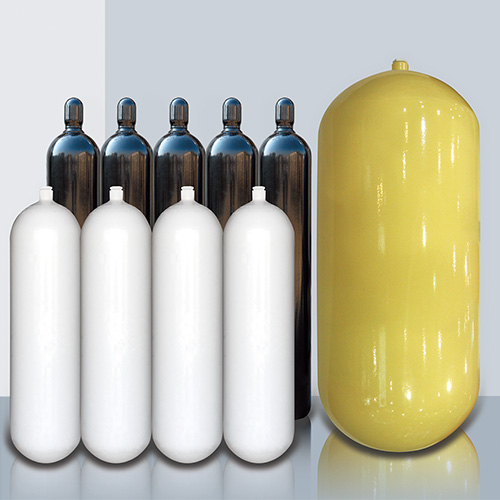Compressed Natural Gas (CNG) is a cleaner-burning fuel composed mainly of methane gas. It is extracted from natural gas wells and undergoes compression to reduce its volume for efficient storage and transportation. CNG offers several advantages over conventional fuels, including lower emissions, reduced carbon footprint, and cost savings.
CNG gas cylinders play a crucial role in the storage and transportation of compressed natural gas. These cylinders provide a safe and reliable means of containing CNG while maintaining its high pressure. They are designed to withstand the stress of compression and ensure the integrity of the gas within.

CNG gas cylinders are typically made of high-strength materials such as steel, aluminum, or composite materials. They are engineered to withstand high pressures, ranging from 200 to 250 bar (2,900 to 3,600 psi), depending on the specific application. The cylinders are cylindrical in shape and are equipped with valves for filling and releasing the gas.
Safety is a primary concern when it comes to CNG cylinders. Rigorous testing, certification, and adherence to safety standards are essential in their manufacturing and usage. Cylinders undergo stringent quality control measures, including hydrostatic testing, to ensure their integrity and resistance to rupture.
CNG gas cylinders offer several advantages:
Environmentally Friendly: CNG is a cleaner-burning fuel compared to gasoline or diesel, emitting lower levels of pollutants such as carbon dioxide, nitrogen oxides, and particulate matter. By using CNG, we can significantly reduce air pollution and contribute to mitigating climate change.
Cost Savings: CNG is generally cheaper than conventional fuels, providing cost savings to both individual consumers and fleet operators. Additionally, the maintenance costs of CNG-powered vehicles are often lower due to reduced wear and tear on engine components.
Abundant Supply: Natural gas, the primary source of CNG, is abundantly available in many regions around the world. This ensures a reliable and consistent fuel supply, reducing dependence on imported fossil fuels.
Energy Security: Utilizing CNG as a fuel source enhances energy security by diversifying the energy mix. It reduces reliance on imported oil and promotes the utilization of domestic natural gas resources.
The widespread adoption of CNG as a transportation fuel requires a well-developed infrastructure for refueling. CNG refueling stations, equipped with compressors, storage facilities, and dispensers, are essential to support the growing number of CNG-powered vehicles. Building a robust CNG infrastructure ensures convenient access to fuel for consumers and encourages further adoption of CNG technology.
CNG gas cylinders find applications in a wide range of vehicles, including passenger cars, buses, trucks, and even motorcycles. They are also used in industrial and commercial sectors, powering forklifts, generators, and other equipment. CNG cylinders enable the efficient storage and utilization of natural gas in various transportation and industrial applications.
The use of CNG gas cylinders contributes to a more sustainable future. With lower emissions of greenhouse gases and pollutants, CNG helps improve air quality and reduce the carbon footprint of transportation. Additionally, the use of CNG encourages the development and utilization of renewable natural gas, further enhancing the sustainability of this fuel source.
CNG gas cylinders play a vital role in enabling the use of compressed natural gas as a cleaner and more sustainable fuel. Their design, construction, and adherence to safety standards ensure the safe storage and transportation of CNG. With its environmental benefits, cost savings, and abundant supply, CNG, supported by reliable gas cylinders, has the potential to transform the transportation sector and contribute to a greener future.
Copyright:@2020-2021
Comments Please sign in or sign up to post.
0
0 of 500 characters used